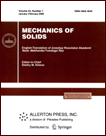 | | Mechanics of Solids
A Journal of Russian Academy of Sciences | | Founded
in January 1966
Issued 6 times a year
Print ISSN 0025-6544
Online ISSN 1934-7936 |
Archive of Issues
| Total articles in the database: | | 13427 |
| In Russian (Èçâ. ÐÀÍ. ÌÒÒ): | | 8178
|
| In English (Mech. Solids): | | 5249 |
|
| << Previous article | Volume 39, Issue 2 / 2004 | Next article >> |
| S. V. Zhizherin and V. V. Struzhanov, "Iteration methods and stability in the problem of uniform deformation of a sphere whose central zone is made of a material subject to damage," Mech. Solids. 39 (2), 89-98 (2004) |
| Year |
2004 |
Volume |
39 |
Number |
2 |
Pages |
89-98 |
| Title |
Iteration methods and stability in the problem of uniform deformation of a sphere whose central zone is made of a material subject to damage |
| Author(s) |
S. V. Zhizherin (Ekaterinburg)
V. V. Struzhanov (Ekaterinburg) |
| Abstract |
Iteration methods are widely used for solving various nonlinear boundary-value
problems of solid mechanics. Convergence of iteration procedures is a
sufficient condition for the determination of a stress-strain state. If a
procedure diverges, then the effect under consideration is not, as a rule,
observed in the physical state of the body.
The most reasonable idea is that the divergence of iterations is associated
with instability of the equilibrium of the body. This instability is caused by
the appearance of regions containing a physically unstable material which does
not satisfy the Drucker postulate. The instability of the material manifests itself
in a descending portion with negative tangent on the stress-strain curve. The
instability is associated with the process of softening caused by the growth of
internal defects, which is equivalent to the decrease in the area of an
effective cross-section actually carrying the load. In the macroscopic
description of the behavior of such materials, the Drucker postulate is not
satisfied [1]. The pronounced effect of strain softening is characteristic of
structurally inhomogeneous materials, such as composites [2], concrete [3], and
geomaterials [3, 4].
Models for the determination of the conditions of loss of stability of a body
as a result of its deformation quite commonly use spherical regions of a
softening material. For example, the author of [5] has analyzed the instability
which causes an earth-quake by introducing a spherical zone of a softening
geomaterial into the rock massif. The localization of strains into a spherical
softening region is investigated in [6].
In the present study, the model with a softening spherical zone is used to
establish the relationship between the divergence of iterations in calculating
the stress state and the loss of stability of the equilibrium of the body. The
uniform tension of a piecewise-homogeneous sphere in accordance with hard and
soft schemes of loading is considered. An internal spherical region of this
sphere is made of a material subject to damage which becomes softening at a
certain value of the volume strain. First, the stresses and strains are
calculated by using various iteration procedures chosen depending on the law of
unloading of the material in the internal region. Then, the stability of
deformation of this system is analyzed by using methods of the catastrophe
theory. As a result, it is established that the beginning of the divergence of
the iteration processes under consideration coincides with the instant of the
loss of stability of deformation of the sphere, at which the stable equilibrium
positions of the system change to unstable ones. Note that the obtained
conditions of loss of stability coincide with those presented in [6] for a
similar system, provided that the statements of the problems have been matched. |
| References |
| 1. | Yu. N. Rabotnov, Mechanics of Solids [in Russian], Nauka,
Moscow, 1988. |
| 2. | L. P. Horoshun and E. N. Shikula, "Deformation of composite materials
with micro-fractures," Prikl. Mekhanika, Vol. 32, No. 6, pp. 52-58, 1996. |
| 3. | G. Frantziskonis and C. S. Desai, "Constitutive model with strain
softening," Intern. J. Solids and Struct., Vol. 23, No. 6, pp. 52-58, 1987. |
| 4. | I. V. Baklashov, Deformation and Fracture of Rock Massifs [in Russian],
Nedra, Moscow, 1988. |
| 5. | J. Rice, "The mechanics of earthquake rupture," in Proc. Intern.
School of Physics "Enrico Fermi". Course 78 "Physics of the Earth's
Interior". 1979. Italian Phys. Soc., pp. 555-649, Horth-Holland, Amsterdam, 1980. |
| 6. | Z. P. Bažant, "Softening instability. P. II. Localization into
ellipsoidal regions," Trans. ASME. J. Appl. Mech., Vol. 55, No. 3,
pp. 523-529, 1988. |
| 7. | L. I. Sedov, Continuum Mechanics. Volume 2 [in Russian],
Nauka, Moscow, 1970. |
| 8. | A. B. Kiselev and M. V. Yumashev, "Deformation and fracture under
shock loading. A model of a thermoelastoplastic medium subject to damage,"
Zh. Prikl. Matematiki i Tekhn. Fiziki, No. 5, pp. 116-123, 1990. |
| 9. | A. N. Kolmogorov and S. V. Fomin, Elements of the Theory of Functions
and Functional Analysis [in Russian], Nauka, Moscow, 1989. |
| 10. | V. V. Struzhanov, "On the fracture of a disk with a weakened central
zone," Izv. AN USSR. MTT [Mechanics of Solids], No. 1, pp. 135-141, 1986. |
| 11. | R. Gilmore, Applied Catastrophe Theory. Volume 1 [Russian
translation], Mir, Moscow, 1984. |
|
| Received |
12 July 2001 |
| << Previous article | Volume 39, Issue 2 / 2004 | Next article >> |
|
 If you find a misprint on a webpage, please help us correct it promptly - just highlight and press Ctrl+Enter If you find a misprint on a webpage, please help us correct it promptly - just highlight and press Ctrl+Enter
|
|

 Russian
Russian  English
English